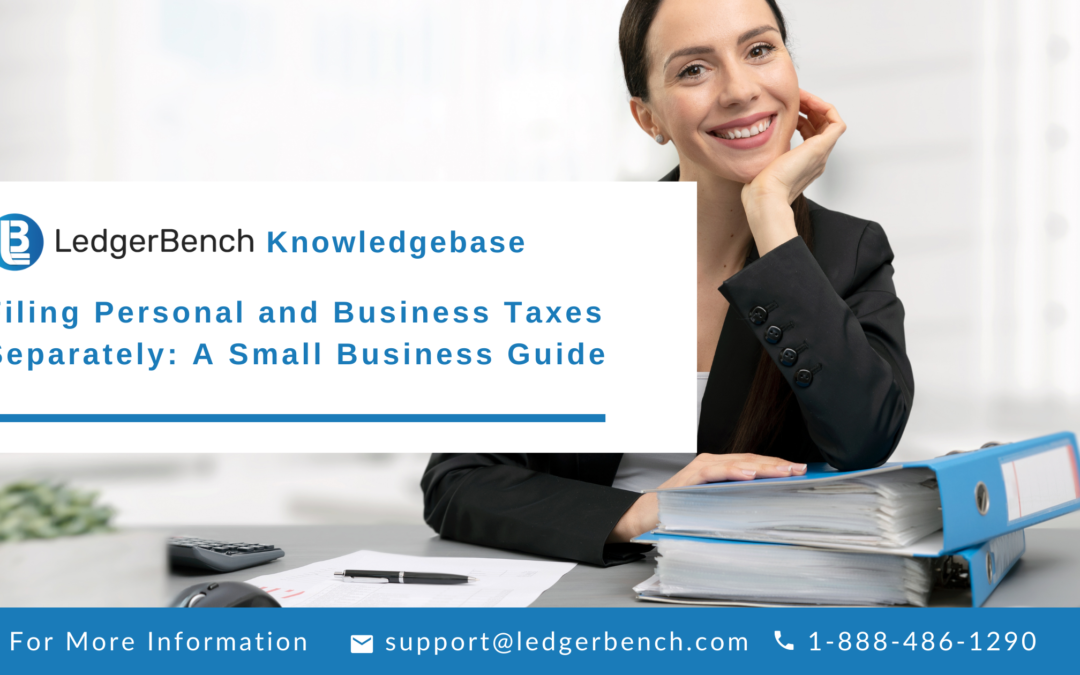
Filing Personal and Business Taxes Separately: A Small Business Guide
Your filing of taxes with the IRS depends upon the business structure. Some business structures such as Corporations must file their taxes separately from their personal taxes. Other business structures such as sole proprietorship must report their business income on their personal taxes.
Let’s see below how each type of small business must file their taxes:
Can I file my personal and business taxes separately?
According to the IRS, you can file your business and personal taxes separately if your company is a corporation. A corporation is a business entity that is seen as a separate entity from its owners that pays its own tax. Corporations can file taxes using Form 1120.
Limited Liability company (LLC) can choose to be treated as a corporation by the IRS, whether they have or multiple owners. They must file their taxes using Form 1120, which means the owner must file their personal and business taxes separately. All other business structures must report their income or losses via the owners personal tax return.
Do you need more time to file your taxes? Use tax Form 4868 or Form 7004 to apply for an extension.
Also Read – What Small Businesses Should Do in Preparedness for COVID-19?
Sole proprietorship:
A sole proprietorship is an unincorporated business that has a single owner. Sole proprietorship report their business income or losses on their personal tax return by using Form 1040. To report profit and loss from their business, they must also file Schedule C (Form 1040). Filing taxes as a sole proprietor is fairly a straightforward affair.
Self-Employed:
The IRS considers Self-employed if they are sole proprietor, an independent contractor or in business for yourself in any other way or even part time. The reporting rules are the same as sole proprietorship, report business profits and losses on your personal income tax return (Form 1040) as well as Schedule C. You can’t file your business taxes separately from your personal taxes.
Partnerships:
A partnership is a business owned by two or more people. These people share in the profits and the losses and contribute for labor, skilled, money or property. According to the IRS, partnership reports their share of the business profits or losses on their personal income tax return (Form 1040). The partnership must also file their information return, Form 1065.
Limited Liability Company (LLC):
LLCs are business structures that are regulated by each individual state. Owners of LLCs are called members and most states permit LLCs to only have one owner. LLCs with two or more owners are classified as partnerships unless they elect to be treated as a corporation.
While LLcs with one owner are treated as a business entity disregarded from its owner, unless it is asked to be treated as a corporation. If LLC can’t be elected to be treated as a corporation then, profit and loss will be reported on the owner’s personal tax return. Corporations can file their business taxes separately. Partnerships and entities disregarded from its owner must file their business taxes via their personal tax return (Form 1040)
LLCs can be asked to be treated as corporations otherwise change their status by filing Form 8832.
You May Also Read – A Step-By-Step Guide to Ensure Payroll Compliance!
Can you file LLC business taxes with Personal Taxes:
Yes, you may file LLC business taxes with personal taxes unless you are asked to be treated as a corporation. LLCs can ask the IRS to be treated as a corporation, partnership or disregarded entity by filing form 8832.
What is the LLC Tax Rate for 2020?
The most popular business structure is LLC. It is a business where the owners are not liable for the company’s debt or liabilities.
According to Greenbush Financial Corporation, The LLC tax rate for 2020 is 21% for the LLCs that are to be treated as corporations. Many LLCs are taxed as pass through entities not corporations, and they are not taxed this flat rate of 21%
Pass through entities are businesses whose profit and loss are reported on the owner’s personal income tax return. This means that these owners are taxed at standard income tax rates.
How to File Taxes for an LLC with No Income:
Filing taxes for an LLC with no income depends on the business structure. An LLC that is treated as a partnership by the IRS must file an information return using Form 1065 even if it has not earned any income.
An LLc that is treated as a corporation by the IRS, must file an income tax return using Form 1120, unless they are exempt under section 501. According to the IRS, Exempt organizations include charities and religious organizations.
If an LLC is treated as a disregarded entity by the IRS, they must still report their lack of income via Schedule C (Form 1040).

